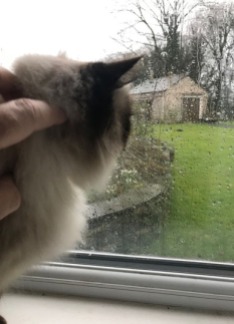We were spending a few days in Alnmouth, a tiny Northumberland village with one of the best beaches in the country. I rarely get to swim in the sea these days, but such things are of vital importance to our Collie dog, Tess, who loves to chase a ball down a beach and into the waves.

It was early morning. I was enjoying our walk. Tess was already wet through and dripping with morning-sun happiness. There were only four of us on the entire beach: a middle-aged couple were walking towards us, along the line of the sea.
I looked at them, then looked again. The woman was carrying two large-lensed cameras, and slightly stooped with the weight. Such heroism demands recognition, so I laughed across at them as they drew level.
“Those are mighty-looking lenses!’
At first, they looked troubled, as though I were some English football hooligan, about to rob them. Then the man said something in broken English and I realised they were Dutch… and I had spoken rather quickly and in a quick-fire humorous way, typical of the English in that situation. The cameras straps were wrapped across and beneath the lady’s breasts, and I realised with horror that my gesticulations might have been horribly misinterpreted.
I back-tracked quickly and explained my admiration for the camera gear, and they began to smile, sharing the humour instead of being anxious about it. I took my rather smaller (iPhone) camera from my jacket pocket and laughed about the comparative size of the photo equipment.
They warmed to the stranger, and for the next five minutes we talked and laughed, as I helped them to say what they wanted to. I speak a little German and French which helps with translation, even if I can’t find all the right vocabulary. People from the Netherlands are often able to converse in three or four languages, but these two had little English. Between us, we persevered and had a pleasant and informative exchange. They went on their way smiling at the early morning encounter with the dog and the man who turned out not to be a football yob…
But the initial look on the face of the lady carrying the massive cameras across her shoulders and chest stayed with me for the rest of the day, and caused me to formulate this post.
Had there been no way of breaching the language gap, they would have left with a very negative view of the encounter. And yet they would have been wrong… Like all of us, their lightning-fast perception and conclusions would have determined how those few minutes of conversation were entered into.
In my head, I could play back the encounter and run it in different ways. Reality, in real-time, doesn’t do that. We might say, traditionally, that the ‘now’ comes at us from the future with a content we can’t fully predict, but which is subject to probabilities. If my last footstep was on a beach in Northumberland, my next footfall is unlikely to be in Utrecht. The world around me is stable – to a degree. But nothing is entirely determined.
This is particularly true of our interactions with others…
We can’t go around greeting each new person as though we were a child, bright with life and openness. In an ideal world we might, but maturity and discretion teach us that human manners have a purpose – not least of which is to prevent us getting thumped.
Over the years of our life, we have built a kind of ‘perception wall’ around us. This wall of sensibilities – an extension of our mind, recognises ‘types’ of events – and people – coming at us from the immediate future. Our enemies or likely potential enemies are well identified, and invoke a whole set of protective behaviours. The violent drunk staggering out of the pub and lurching towards us, swearing, is an example of the invoking of avoidance.
Others are not so well defined. We all use different classifications to mark the approach of that near-future. This creates a gradient of relaxation-warmth at one end, and potential violence at the other. One of the most important human conditions is to be able to exchange positive humour with a stranger; based on a shared set of current circumstances; a shared misfortune of a mild nature (like just missing that bus) is an example.
These occasions leave positive feedback and good memories of those well-spent moments, when vocal and non-vocal cues act as a binding framework for a good-natured encounter. They are like good food. We need them, if only to re-assert our level of humanity and our belief in the goodness of others… something that we be starved of.
Could we take it further and suggest that we actually create our future? My footfall is never going to land in Utrecht, but my pre-judgement of the person approaching me along that pavement has enormous control over the approaching ‘now’.
If you can, try this for a few days. Study the facial expressions of people coming at you, with the willed intention of making a new friend – if only for a moment. Don’t pick someone you like the look of; select a person you wouldn’t normally speak to, but, obviously not one who gives you the chills.
As the very last moment before your ‘meeting’, hold the thought that you have something warm in common. Look onto their eyes, smiling and see what fills that brave space you’ve just created to hold ‘the link’.
You might be surprised what happens, and how you can look back on something that could not have come into existence unless you had altered your expectations…thereby changing the probabilities within the approaching ‘now’. In reality, of course, there is no approaching now, there is only now, filled with constant changes. We do not move into the future. What is around us ‘morphs’ into its new form and we call it time. We measure time by the those changes. Clocks are a form of special agreement as to what the changes represent…
The world is really our world, ‘projected on’ by our expectations, fears and joys.
The Dutch lady with the big lenses didn’t allow for this. The ill-spoken potential ‘English yob’ with the ‘big dog’ had, smilingly and sinisterly, said something abusive in a way she didn’t understand. They were set on leaving the scene, as fast as possible.
I had to use intelligence, charm and sincerity to dig back to the words of that moment and show that only warmth and shared humour were intended. Our wonderful minds allow for that – and our astonishing language that can hold and describe concepts as vast as present and future.
That next second in all our lives is coming around that corner, now, and its nature is significantly undetermined… until we act with familiarity or with self-defence. And mind precedes action. In that sense, creating our own future is a very real thing.
©Stephen Tanham 2021
Stephen Tanham is a Director of the Silent Eye, a journey through the forest of personality to the dawn of Being.
http://www.thesilenteye.co.uk and http://www.suningemini.blog




























Well recovered, Steve. A potentially embarrassing incident. Indeed, it could have been damaging to international relations at a time when our friends in Europe are few! A laugh and a joke when there’s a language barrier can quickly lead to trouble when not everyone assumes good intent.
LikeLiked by 1 person
Thank you, Michael! And who needs friends in Europe, anyway… errrr….
LikeLiked by 1 person
Trust is in short supply. But I do say hello to people on the street sometimes, and they almost always smile and say hello back. I should probably do it more. (K)
LikeLiked by 1 person
As should we all, Kerfe. Thank you 😊
LikeLiked by 1 person
As Michael said “well recovered” Steve had you not it could as you know have made a lasting and not necessarily pleasant memory for them..worst fears realised etc..well rescued 🙂
LikeLike
Thank you, Carol. As you say, it could have gone horribly wrong! Thankfully, it turned into a very positive example…😎
LikeLiked by 1 person